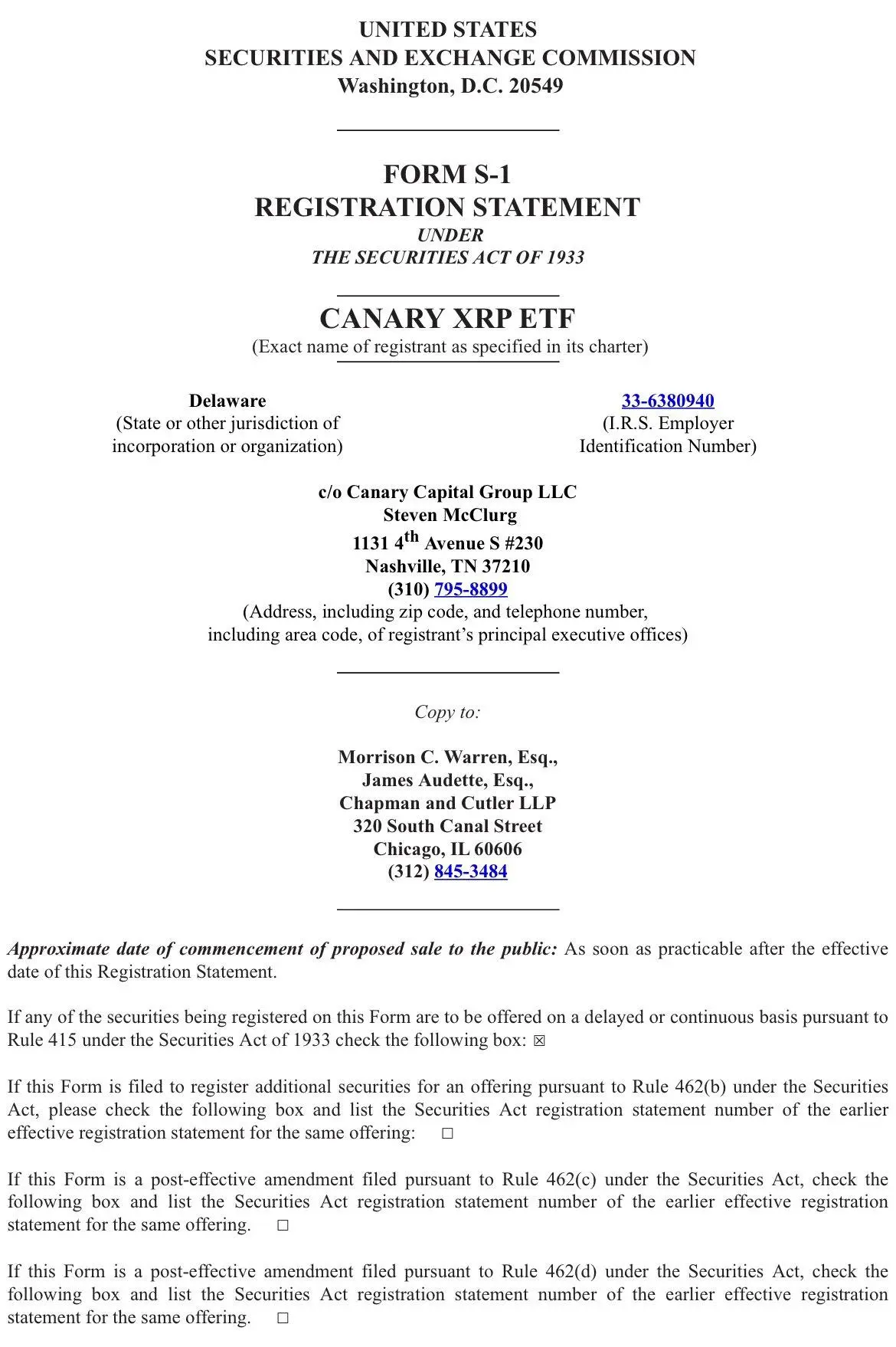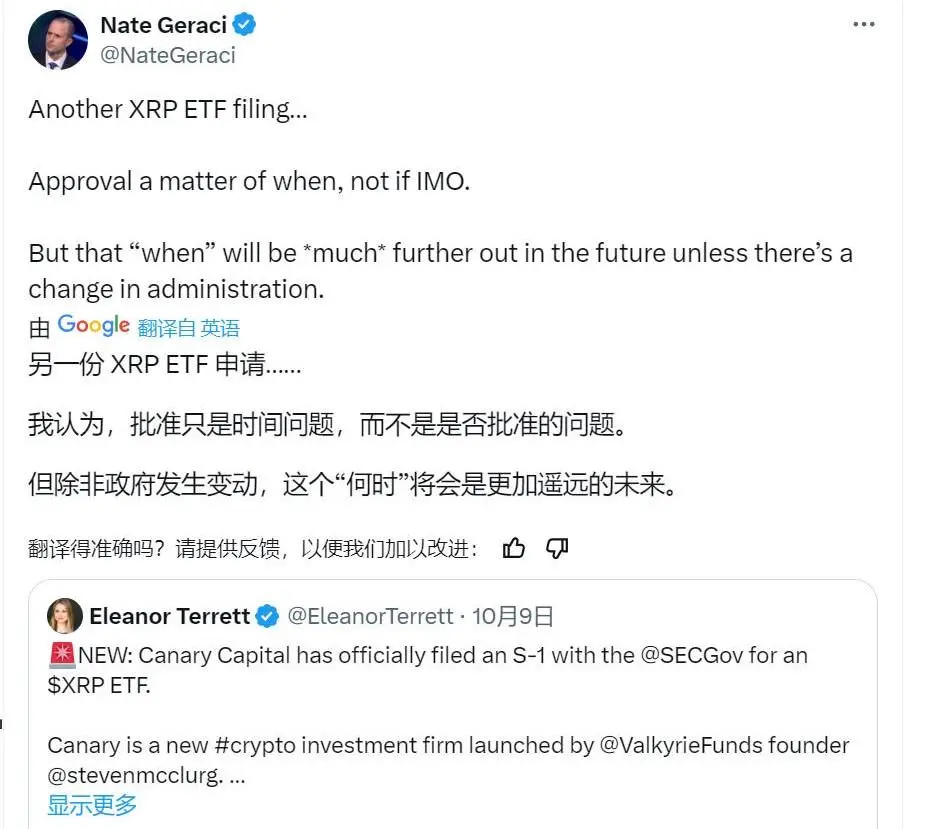Author: Weilin, PANews
After the approval of spot Bitcoin and Ethereum ETFs by the U.S. Securities and Exchange Commission (SEC) this year, crypto investors have been speculating that other token-related ETFs may emerge in the future, with particular attention on popular tokens like SOL, DOGE, and XRP.
Now, two crypto asset management companies have taken new actions. On October 8, the U.S. crypto investment firm Canary Capital, established in September, submitted its S-1 application for a spot XRP ETF to the SEC. Just a week earlier, the crypto asset management company Bitwise also submitted a similar application, further increasing market attention. What background does Canary Capital have compared to the more familiar Bitwise?
Meanwhile, will the spot XRP ETF be approved in the U.S., becoming the third type of crypto asset spot ETF after Bitcoin and Ethereum? Nate Geraci, president of ETF Store, believes that the approval of the XRP ETF is just a matter of “when,” not “if.” However, he expects that approval may come only after the U.S. government changes.
Canary Capital, Established Just a Month Ago, Joins Bitwise in the XRP ETF Application Queue
Bitwise submitted its S-1 application for the XRP ETF (Exchange-Traded Fund) to the SEC on October 2. The company currently manages a Bitcoin ETF BITB and an Ethereum ETF ETHW.
On October 8, the crypto investment company Canary Capital also submitted its application for a spot XRP ETF to the SEC. According to its application documents, Canary Capital stated that its ETF would provide clients access to the market for Ripple’s native token (XRP) through traditional brokerage accounts, eliminating the risks and restrictions associated with directly purchasing and holding the tokens. Additionally, the investment company disclosed that its XRP would utilize the CF Ripple Index from the Chicago Mercantile Exchange (CME) to track the price of XRP. At the same time, Canary Capital plans to ensure that its ETF does not rely on other derivatives when tracking the value of XRP to reduce potential counterparty and credit risks. Currently, Canary Capital has not disclosed the code and potential custodian for its ETF.

Steven McClurg, founder and CEO of Canary Capital, commented on this new development. He pointed out that the company’s decision to launch the XRP ETF was inspired by positive signs in the cryptocurrency regulatory environment. He stated that investors are increasingly interested in obtaining high-level access to crypto assets, which inspired the company to take this action. He also mentioned that the demand is not limited to Bitcoin and Ethereum-related products, as more investors are seeking investment opportunities like Ripple’s native token. It is understood that Steven McClurg is a co-founder of Valkyrie Funds.
Canary Capital is a newly established crypto investment company founded in September. On October 1, Canary Capital announced the launch of the first HBAR trust in the U.S., with HBAR being the native cryptocurrency of the Hedera network. In addition to McClurg, Canary Capital is also led by Josh Olszewicz, who serves as the portfolio manager and has extensive expertise in investment and the crypto field. Furthermore, Canary Capital offers crypto hedge fund solutions, including a “Barbell Strategy” designed specifically for complex and institutional investors.
Will the XRP ETF Be Approved in the U.S.?
The spot Bitcoin ETF launched in January exceeded expectations, with a total net inflow of approximately $18.68 billion as of October 9. However, the recently launched Ethereum ETF has performed poorly, with a total net outflow of $562 million since its listing in July as of October 9.
Some analysts believe that the spot XRP ETF may not be approved due to the SEC’s legal dispute with Ripple. Although a judge has ruled that XRP is not a security and imposed a $125 million civil penalty on Ripple, the SEC is still appealing this ruling. The appeal is taking place in the U.S. Court of Appeals for the Second Circuit in Manhattan, New York. Since the SEC filed a lawsuit against Ripple Labs, XRP’s ranking has dropped from the second-largest crypto asset to the seventh-largest asset.
Despite the pessimistic market sentiment, some in the cryptocurrency industry still believe that the XRP ETF will eventually be approved. “This indicates that ETF providers will closely monitor changes in the regulatory environment to seize opportunities to launch new products,” said Stephane Ouellette, co-founder and CEO of FRNT Financial. “While there is still uncertainty about whether these products will be approved, it makes sense for two companies from the crypto space to try to expand their product offerings.”
ETF Store president Nate Geraci stated that the approval of the ETF is just a matter of time, not whether it will be approved. However, he believes that this approval may be delayed until after the U.S. government changes.

Currently, market attention on XRP has significantly increased. Digital asset giant Grayscale recently launched the Grayscale XRP Trust, providing investors with another way to access digital tokens supported by the XRP Ledger (XRPL).
Meanwhile, other asset management giants like VanEck and 21Shares are also seeking ETFs linked to the price of Solana (SOL). However, Grayscale’s XRP trust fund manages only $1.5 million in assets, while its Solana trust fund has assets exceeding $73 million.
Bloomberg ETF senior analyst Eric Balchunas stated, “Have you heard of Fed put options? It’s like Trump call options. Currently, the ETF applications for XRP, SOL, or any other altcoin are like betting on Trump’s victory with cheap call options because SEC Chairman Gensler will be leaving, and anything can happen. If Harris ultimately wins, these applications won’t get approved at all, and this call option will become worthless.”
In the derivatives market, call options are all-or-nothing bets on whether an asset will reach a specific price. If the asset reaches the price of the call option, there will be substantial returns. Balchunas’s point is that companies deciding to apply for crypto ETF approvals, whether for XRP, Solana, or any other crypto asset, are essentially betting on Trump’s winning the presidency.
The SEC has stated that spot cryptocurrency ETFs cannot be listed on U.S. exchanges until there is a highly correlated, regulated futures market for the corresponding assets. Katalin Tischhauser, head of investment research at crypto bank Sygnum, pointed out that such a market currently exists only for Bitcoin and Ethereum, and not for other crypto assets. Bitcoin and Ethereum are the only crypto assets with regulated futures markets on the Chicago Mercantile Exchange (CME).
However, Tischhauser also noted that Bitwise’s XRP ETF application is likely intended to “start the clock,” hoping that the SEC’s stance will change after the elections. Earlier this year, Ripple Labs CEO Brad Garlinghouse stated that ETFs for XRP and other crypto assets are “inevitable” after the approval of the Ethereum ETF. He mentioned on Fox Business News, “People want access to more than just one commodity.”
At present, the applications from Canary Capital and Bitwise bring hope for the approval of the XRP ETF, but the legal dispute between the SEC and Ripple still poses challenges for the product’s approval, and the upcoming U.S. election results will also influence the process. In the current complex regulatory environment, the future of the XRP ETF is filled with uncertainty, but it will undoubtedly become a major focus in the crypto market, warranting close attention.
ChainCatcher reminds readers to view blockchain rationally, enhance risk awareness, and be cautious of various virtual token issuances and speculations. All content on this site is solely market information or related party opinions, and does not constitute any form of investment advice. If you find sensitive information in the content, please click “Report”, and we will handle it promptly.

